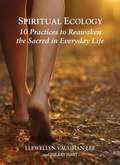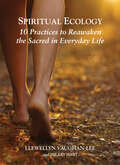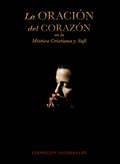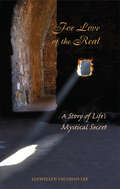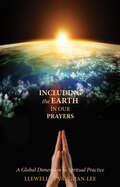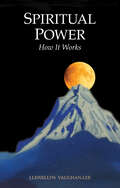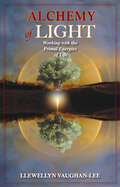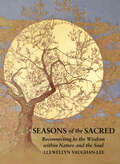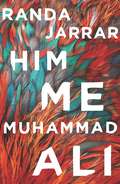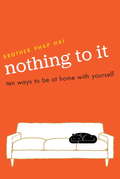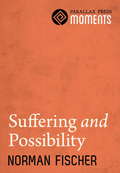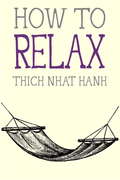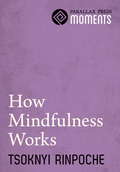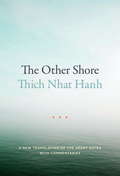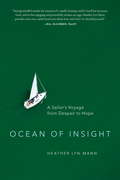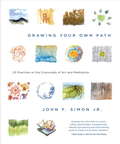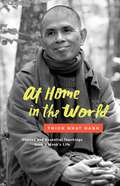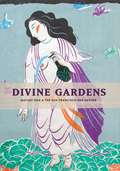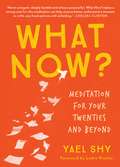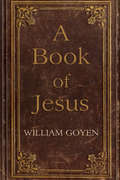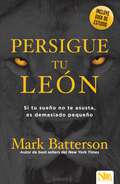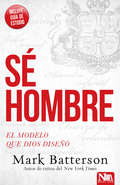- Table View
- List View
Spiritual Ecology: 10 Practices to Reawaken the Sacred in Everyday Life
by Llewellyn Vaughan-Lee Hilary Hart<i>Spiritual Ecology: 10 Practices to Reawaken the Sacred in Everyday Life</i> offers inspiring and practical guidance for reconnecting to the sacred in every day life and transforming our relationship with the Earth. Describing the power of simple, daily practices such as Walking, Gardening, Cooking with Love, and Prayer, this small book supports profound changes in how we think about and respond to the ecological crisis of our times.
Spiritual Ecology: 10 Practices to Reawaken the Sacred in Everyday Life
by Llewellyn Vaughan-Lee Hilary HartSpiritual Ecology: 10 Practices to Reawaken the Sacred in Everyday Life offers inspiring and practical guidance for reconnecting to the sacred in every day life and transforming our relationship with the Earth. Describing the power of simple, daily practices such as Walking, Gardening, Cooking with Love, and Prayer, this small book supports profound changes in how we think about and respond to the ecological crisis of our times.Spiritual Ecology: 10 Practices to Reawaken the Sacred in Everyday Life follows our groundbreaking Spiritual Ecology: The Cry of the Earth, now in its second edition, which included spiritual perspectives on climate change, species loss, deforestation, and other aspects of our present environmental crises from renowned spiritual teachers, scientists, and indigenous leaders. That book drew an overwhelmingly positive reaction from readers, many of whom are asking: "What can I do?"Spiritual Ecology: 10 Practices to Reawaken the Sacred in Everyday Life answers that question with inspiring, personal anecdotes from the author – Sufi teacher Llewellyn Vaughan-Lee – and simple practices we all can do. Rooted in the mystical foundation of the world's great spiritual traditions, with a particular connection to Sufism, these timeless practices remind readers of our deep connections to life, each other, and the Earth, and invite a return of meaning to our desecrated world.As Rumi says, "there are a thousand ways to kneel and kiss the ground," and it is this sacred ground that is calling to us, that needs our living presence, our attentiveness. This small book offers simple ways to reconnect so that we can once again feel the music, the song of our living connection with the Earth.
La Oración del Corazón en la Mística Cristiana y Sufí
by Llewellyn Vaughan-LeeGuiando al lector por los estados de la oración mística —un modo de crear una relación viva con lo Divino en el corazón—, este libro recurre a fuentes cristianas y sufíes como Santa Teresa de Jesús, San Juan de la Cruz y Rumi. Llewellyn Vaughan-Lee describe los estadios de oración: cómo al principio la oración nace de la necesidad, pero luego lleva a uno profundamente al corazón, a los estadios de unión y éxtasis. Por medio de la oración mística, uno es atraído al silencio de la comunión real con Dios. Aquí, en el silencio del corazón, tiene lugar un encuentro y una fusión que lleva a uno más allá del yo personal al misterio de la presencia divina. Esta exploración indaga en el secreto de cómo rezar incesantemente, en que la oración cobra vida en el corazón, e incluye un capítulo sobre la necesidad de rezar por el bienestar de la Tierra. Une las tradiciones místicas cristiana y sufí, y quiere ser provechoso a todo practicante de la oración que se sienta atraído a descubrir la relación con Dios en su corazón.Guiding the reader through the stages of mystical prayer—a way to create a living relationship with the Divine within the heart—this book draws upon Christian and Sufi sources such as St. Teresa of Avila, ‘Attâr, St. John of the Cross, and Rûmî. Llewellyn Vaughan-Lee describes the stages of prayer: how prayer is first born of need, but then takes one deep within the heart, into the stages of union and ecstasy. Through mystical prayer, one is drawn into the silence of real communion with God. Here, in the silence within the heart, a meeting and merging takes place that carries one beyond the self into the mystery of divine presence. This exploration delves into the secret of how to pray without ceasing, in which prayer becomes alive within the heart, and includes a chapter on the need to pray for the well-being of the Earth. It brings together the Christian and Sufi mystical traditions and will benefit any practitioner of prayer who is drawn to discover a relationship with God within their heart.
For Love of the Real: A Story of Life's Mystical Secret
by Llewellyn Vaughan-LeeA detailed description of the mystical journey to Absolute Truth from Llewellyn Vaughan-Lee. At the root of every mystical calling is the search for what is Real; this book follows this call, detailing the inner journey to Absolute Truth. Readers are guided through traditional experiences of the path—emptiness and the void, oneness, and communion with nature. Particular direction is given for how contemporary seekers can—and must—engage with challenges unique to our times, such as extreme materialism and ecological devastation. A pioneer in the subject of Spiritual Ecology Llewellyn Vaughan-Lee offers spiritual guidance on the vital need to restore a sacred connection to life and the environment. For Love of the Real is a much needed in-depth exploration of the contribution spiritual life can make to our present environmental crisis.
Including the Earth in Our Prayers: A Global Dimension to Spiritual Practice
by Llewellyn Vaughan-LeeIncluding the Earth in Our Prayers tells a story of love and prayer, how spiritual practice is not just for ourselves, our own journey, but for life itself. It steps back to reclaim the wisdom of our ancestors, including the "Original Instructions" of Indigenous peoples—how we need to "get along" with all of creation—and relates these teachings to the need of our present time. With our ecosystem in crisis and our culture increasingly divisive, it suggests ways in which the energy and transformative potential of our spiritual nature can be applied to these critical issues, and reconnects us with a spiritual understanding of the living Earth. The simple premise of this book is that there is a vital need to shift our collective culture from a story of separation and exploitation into a new story of living oneness, and that spiritual practice, and the love and light it generates, have an essential part to play in this shift.
Spiritual Power: How It Works
by Llewellyn Vaughan-LeeHow can we use spiritual power to help heal and transform our world? In this new, fully revised edition, Llewellyn Vaughan-Lee shows how spiritual activism addresses our current global crisis in a visionary and revolutionary way. He reintroduces us to the ancient wisdom of the power of the land, as well as the ways we can use our light and love to create real change. Spiritual Power explores how spiritual practice and spiritual energy have a central part to play as a catalyst in the vitally needed shift from the story of separation—that lies at the root of our present ecocide—to a new story of the Earth's multihued unity. This is practical mysticism on a global level, the simple wisdom that can reconnect us to the magic of life and awaken us to its essential oneness.
Alchemy of Light: Working with the Primal Energies of Life
by Llewellyn Vaughan-LeeDelving into the inner world of archetypes and drawing on the ancient tradition of alchemy, this reflective guide emphasizes the inner spiritual light of each individual as part of the spiritual light of the world, and as a potent agent for the global change that is needed at this time of accelerating ecological devastation. Spiritual seekers—those interested in higher consciousness, spiritual activism, spiritual service, and the connection between spirituality and everyday life—will learn how to recognize their own spiritual light and to work with it in service of life, expanding their spiritual horizon from their own individual journey to encompass the fate of all of life on this planet.
Seasons of the Sacred: Reconnecting to the Wisdom within Nature and the Soul
by Llewellyn Vaughan-LeeIn this timely third book in his "Spiritual Ecology" series, Llewellyn Vaughan-Lee continues his exploration of the many facets of interconnection between humanity and the Earth. Deeply spiritual but not religious, "Seasons of the Sacred" weaves together narratives, poems, and images from various sources to illuminate the hope, beauty, abundance, and darkness of the Earth's cycles and humanity's place therein.Likening Spring to falling in love, Summer with abundance and spiritual awakening, Fall with fruition and wisdom, and Winter with contraction and emptiness, the collected wisdom reflects the profound resonance of humanity within nature and emphasizes the deep alignment between the Earth and human soul. Ultimately, Vaughan-Lee tells a story of connection and synchronization, illustrating how humanity and the Earth are journeying together in both obvious and mysterious ways, mutually sharing, adapting, and learning. While Vaughan-Lee is a Sufi teacher, the book offers nature-based wisdom from Christianity, Buddhism, Judaism, and literary traditions from across the ages.Vaughan-Lee adeptly connects the reader to the deepest envisioning of contemporary challenges. Climate catastrophe, refugees, cultural degradation, and political divisiveness are all contextualized within natural cycles of birth, loss, and transition, and the reader is guided to listen through the fear and anxiety of our age to the deeper ground of belonging that calls from even the most destitute inner and outer landscapes.Never more relevant than now, the chapter on Winter points the reader to what is most essential even as the temporal is stripped away like autumn leaves, providing some assurance that there is meaning and even peace amidst the devastation of our present time. As with other books in this series, Vaughan-Lee places the human story within the story of the Earth and compels the examination of attitudes, beliefs, and habits in relation to the ongoing desecration, ecological devastation—and potential restoration—of our sacred home.
Him, Me, Muhammad Ali
by Randa JarrarIn her first story collection, Jarrar employs a particular, rather than rhetorical approach to race and gender. Thus we have "How Can I Be of Use to You," with its complicated relationship between a distinguished Egyptian feminist and her young intern, demonstrating that gender politics are never straightforward, and both generations-old and new-take advantage of each other. There's also a healthy dose of magic surrealism, as in the wild and witty story "Zelda the Halfie" which follows a breed of half Ibexes/half humans and their various tribulations. The writing is peppered with gorgeous imagery: a moon reflected in an ice cream scoop, breath that runs ahead of its body, and two apartments in a high rise whose tenants precisely mirror each other.Randa Jarrar is the author of a highly successful novel, A Map of Home, which received an Arab-American Book Award and was named one of the best novels of 2008 by the Barnes & Noble Review. She grew up in Kuwait and Egypt, and moved to the United States after the first Gulf War. Her work has appeared in the New York Times Magazine, the Utne Reader, Salon.com, Guernica, the Rumpus, the Oxford American, Ploughshares, and more. She blogs for Salon, and lives in California.
Nothing To It
by Brother Phap HaiIn Nothing To It, Brother Phap Hai brings his characteristic warmth and humor to explore the many different gates to transformation offered by Buddhism. A gate is a teaching, practice, or way of looking at things. Each gate is an invitation to consider a new frame of reference through which we can consider our situation, an opportunity to look at things differently. Readers who enjoyed Bhante Gunaratana's Mindfulness in Plain English will delight in this new explanation from the Australian-born Abbott of Deer Park Monastery in Escondido, California.There are fifty-eight gates explored in Nothing To It, arranged in ten traditional groups, with one chapter exploring each gate. Based on a series of talks given by Phap Hai in 2013, the book is designed to be equally valuable when read through at leisure or used as the text for a ten week self-guided course. Each chapter includes questions for reflection, additional reading suggestions on the topic, and writing exercises. The gates can be explored in order or investigated at random. Phap Hai's charming blend of ancient wisdom, Dharma scholarship, and contemporary applications will offer all who read Nothing To It a new way of seeing the extraordinary opportunities for transformation in
Nothing To It: Ten Ways to Be at Home with Yourself
by Brother Phap HaiIn Nothing To It, Brother Phap Hai brings his characteristic warmth and humor to explore the many different gates to transformation offered by Buddhism. A gate is a teaching, practice, or way of looking at things. Each gate is an invitation to consider a new frame of reference through which we can consider our situation, an opportunity to look at things differently. Readers who enjoyed Bhante Gunaratana's Mindfulness in Plain English will delight in this new explanation from the Australian-born senior monk of Deer Park Monastery in Escondido, California. There are fifty-eight gates explored in Nothing To It, arranged in ten traditional groups, with one chapter exploring each gate. Based on a series of talks given by Phap Hai in 2013, the book is designed to be equally valuable when read through at leisure or used as the text for a ten week self-guided course. Each chapter includes questions for reflection, additional reading suggestions on the topic, and writing exercises. The gates can be explored in order or investigated at random. Phap Hai's charming blend of ancient wisdom, Dharma scholarship, and contemporary applications will offer all who read Nothing To It a new way of seeing the extraordinary opportunities for transformation in everyday life.
Suffering and Possibility
by Norman FischerSuffering and Possibility is part of the Parallax Press Moments series of short ebooks. It is a stand alone chapter from Solid Ground: Buddhist Wisdom for Difficult Times.
How to Relax
by Thich Nhat Hanh Jason DeantonisHow to Relax is part of The Mindfulness Essentials series of how-to titles by Zen Master Thich Nhat Hanh, introducing beginners and reminding seasoned practitioners of the essentials of mindfulness practice. <P> Pocket-sized, with original two color illustrations by Jason DeAntonis, How to Relax shows how critical it is to regularly interrupt the hub-bub and routine of our lives to stop, relax mindfully, and recharge.Thich Nhat Hanh says that when we relax, we "become calm water, and we will reflect reality as it is. If we're not calm, the image we reflect will be distorted. When the image is distorted by our minds, it's not the reality, and it causes lots of suffering." Relaxation is essential for accessing the tranquility and joy that lead to increased personal well-being. With sections on healing, relief from nonstop thinking, transforming unpleasant sounds, solitude, being peace, and more, How to Relax includes meditations you can do to help you achieve the benefits of relaxation no matter where you are.Scientific studies indicate that meditation contributes tremendously to well-being, general health, and longevity. How to Relax is a unique gift for those who want a simple guide to achieving deep relaxation, controlling stress, and renewing mental freshness and clarity, appropriate for those practicing in any spiritual tradition, whether seasoned practitioners or new to meditations.With fifteen two color drawings by celebrated artist Jason DeAntonis.
How Mindfulness Works
by Tsoknyi RinpocheHow Mindfulness Works> is part of the Parallax Press Moments series of short ebooks. A stand alone chapter from Solid Ground: Buddhist Wisdom for Difficult Times.
The Other Shore: A New Translation of the Heart Sutra with Commentaries
by Thich Nhat HanhThis new translation of the Buddha's most important, most studied teaching offers a radical new interpretation. In September, 2014 Thich Nhat Hanh completed a profound and beautiful new English translation of the Prajñaparamita Heart Sutra, one of the most important and well-known sutras in Buddhism. The Heart Sutra is recited daily in Mahayana temples and practice centers throughout the world. This new translation came about because Thich Nhat Hanh believes that the patriarch who originally compiled the Heart Sutra was not sufficiently skillful with his use of language to capture the intention of the Buddha's teachings—and has resulted in fundamental misunderstandings of the central tenets of Buddhism for almost 2,000 years. In The Other Shore: A New Translation of the Heart Sutra with Commentaries, Thich Nhat Hanh provides the new translation with commentaries based on his interpretation. Revealing the Buddha's original intention and insight makes clear what it means to transcend duality and pairs of opposites, such as birth and death, and to touch the ultimate reality and the wisdom of nondiscrimination. By helping to demystify the term "emptiness," the Heart Sutra is made more accessible and understandable. Prior to the publication of The Other Shore, Thich Nhat Hanh's translation and commentaries of the Heart Sutra, called The Heart of Understanding, sold more than 120,000 copies in various editions and is one of the most beloved commentaries of this critical teaching. This new book, The Other Shore, supersedes all prior translations.
Ocean of Insight: A Sailor's Voyage from Despair to Hope
by Heather Lyn MannHeather Lyn Mann was a battle-weary environmental advocate in Madison, Wisconsin, struggling over what to do about climate change when she and her husband decided to explore the Atlantic on a small sloop. This memoir of six years living afloat is a chronological unfolding of disasters and discoveries--life-threatening storms, the boredom of isolation, societies on the brink of extinction, sinking ships, colorful Caribbean characters, near collisions, a pirate scare, and more. Throughout, the ocean becomes Mann's teacher, transforming her with uncompromising lessons on how to harmonize with natural order, the exact moments and ways to let in fearlessness, resilience, happiness, impermanence, balance, compassion, skillful action, and beginner's mind. Her suspenseful, sometimes hilarious, and always heart-warming journey of body and mind, shaped by ancient Buddhist teachings, entertains as it charts reality's depths and danger zones so arm-chair adventurers, spiritual seekers, and the climate concerned can navigate tumultuous waters and arrive together on the shore of planetary well-being.From the Trade Paperback edition.
Drawing Your Own Path: 33 Practices at the Crossroads of Art and Meditation
by John F. Simon"Drawing Your Own Path is a smart, subtle, sophisticated, compassionate, radically eye-opening and mind-altering guide to creative and artistic liberation. Thank you, John Simon!"--Ruth Ozeki, A Tale for the Time Being"John F. Simon, Jr., widely recognized as an early pioneer in the use of computer-generated imagery in contemporary art, has turned his attention to the act mark-making as a doorway into self-awareness and the essential touchstone of visual creativity. He leads us through a sequence of meditative drawing exercises, and shares insightful, touching anecdotes of his many years of experience as a practicing artist."--Peter Halley, Artist"The mysteries of the mind and universe are coupled with a very practical guide to drawing. It is an unlikely but wonderfully fruitful combination, a step-by-step approach to awareness and art."--Lawrence Rinder, Director, UC Berkeley Art Museum & Pacific Film Archive"John's marvelous artwork emerges from a deeply inspired and intuitive unfolding. His gift of finding one's own creative process is beautifully transmitted in this delightful guide."--Jon Bernie, Ordinary Freedom "Drawing Your Own Path is an invitation to those who have never drawn before and a warm, informative, intelligent and lovely book to read. It offers refreshing, new ways to look at and experience the steps to make drawings today."--Sharon Louden, Artist, Editor of Living and Sustaining a Creative Life Drawing Your Own Path is an account of how multi-media artist John Simon's daily drawing discipline became a meditation practice, and how that meditation illuminated his creative source. A practical guidebook full of Simon's own art, Drawing Your Own Path offers meditators an alternative path to 'just sitting' and offers artists a way to mindfully examine and deepen the source of their creative ideas. Readers are guided through thirty-three meditation and drawing exercises, exploring concentrated looking, mindful sketching, and improvisational awareness, all designed to help practitioners discover the vast creativity within themselves and in their daily lives.From the Trade Paperback edition.
At Home in the World: Stories and Essential Teachings from a Monk's Life
by Thich Nhat Hanh Jason DeantonisThis collection of autobiographical and teaching stories from peace activist and Zen Master Thich Nhat Hanh is thought provoking, inspiring, and enjoyable to read. Collected here for the first time, these stories span the author's life. There are stories from Thich Nhat Hanh's childhood and the traditions of rural Vietnam. There are stories from his years as a teenaged novice, as a young teacher and writer in war torn Vietnam, and of his travels around the world to teach mindfulness, make pilgrimages to sacred sites, and influence world leaders. The tradition of teaching the Dharma through stories goes back at least to the time of the Buddha. Like the Buddha, Thich Nhat Hanh uses story-telling to engage people's interest so he can share important teachings, insights, and life lessons.From the Hardcover edition.
A Way of Life
by Paul DavisThe beauty and joy of monks and nuns at work and play is captured in this inspiring photobook by Paul Davis, with quotes on joy and work from Zen teacher Thich Nhat Hanh. This is a coffee table photo book by professional photographer and Thich Nhat Hanh student Paul Davis. In candid photos from around the world, Davis captures the joy of the present moment experienced by monks and nuns of all ages in traditional and unexpected activities and locations. Contains 50 full bleed black-and-white and color photographs.
Divine Gardens: Mayumi Oda and the San Francisco Zen Center
by Mayumi OdaKnown to many as "the Matisse of Japan," Mayumi Oda combines traditional Japanese and Buddhist iconography with her own unique sense of color, line, and movement. In this collection, her groundbreaking artwork is paired with essays by San Francisco Zen Center and Green Gulch Farm Zen Center practitioners (including Richard Baker, Linda Ruth Cutts, Wendy Johnson, Edward Espe Brown, and Norman Fischer) who have owned, loved, and been changed by Oda's work over the years.Mayumi Oda's internationally-recognized artwork plays with traditional Japanese and Buddhist images, refiguring them as celebrations of the feminine and the natural world. Where most traditional Buddhist iconography features male figures, Oda introduces female "Goddesses" that seem to jump off the page, imbued with the vibrancy of Oda's color and line.Originally from Japan, Oda settled in Muir Beach, California in the 1970s and began practicing and painting at Green Gulch Farm Zen Center, which Oda calls her "California Buddha Field." Divine Gardens pairs Oda's artwork with essays by her fellow practitioners, for whom Oda's artwork has been a constant companion. Suitable for study by art students or for display on a coffee table, Divine Gardens captures the essence of Mayumi Oda's art and life as a Zen practitioner. The forty-five full-color works of art and twenty-four essays contained in the collection are a joyful celebration of her work and the community forged through the years at the San Francisco Zen Center.
What Now?: Meditation for Your Twenties and Beyond
by Yael ShyBuddhist teachings and meditation offer a roadmap to help college students and others in early adulthood incorporate mindfulness into their lives as a means of facing the myriad struggles unique to this stage of life.Early adulthood is filled with intense emotions and insecurity. What if you never fall in love? What if you can't find work you’re passionate about? You miss home. You miss close friends. You’re lost in the noise of how you think you should be living and worried about wasting what everyone says should be the best years of your life.What Now? shares mindfulness practices to help twentysomethings learn to identify and accept these feelings and respond—not react—to painful and powerful stimuli without pushing them away or getting lost in them. This is not about fixing oneself or being "better." Readers are encouraged to embrace themselves exactly as they are. You are already completely whole, completely loveable, completely worthy. What Now? shares practices that help us to wake up to this fact. This uniquely tumultuous developmental period is a time when many first live away from home and engage in all kinds of experimentation—with ideas, substances, relationships, and who we think we are and want to be in the world. Yael Shy shares her own story and offers basic meditation guides to beginning a practice. She explores the Buddhist framework for what causes suffering and explores ideas about interconnection and social justice as natural outgrowths of meditation practice.
When You Die You Will Not Be Scared to Die
by Lindsay TunklThis brief artistic collection of fears around dying--and their ultimate futility in the face of the unknown--is a keepsake, a prayer book, a prompt for contemplation, and a gift to give to others to inspire conversations about the liberating power of death and what makes a good life.This small book of 12 meditations on death is intentionally repetitive and hypnotic in effect, and will inspire the reader to list what scares them most, come to terms with their own mortality, and realize what fears are holding them back from living a life fully with 100 percent commitment. It will appeal to anyone who wishes to live with greater intention and purpose and experience more joy and appreciation of the present moment. Buddhists and mindfulness practitioners, people who are aging, people who read the news and are worried, artists, people who are taking care of others who are dying, people who are dying (i.e., all of us ...), Tarot card readers and modern-day shamans will all find inspiration in these terse lists. Young people aghast at the adult world's seeming indifference to our mortality will especially relate to the uncompromising vision of this book.
A Book of Jesus
by William GoyenA non-fiction work by Goyen--his attempt to explain who Jesus Christ was utilizing Christ's own words.
Persigue tu leon: Si tu sueño no te asusta, es demasiado pequeño
by Mark BattersonCuando la imagen de una bestia devoradora de hombres viaja a través del nervio óptico hacia la corteza visual, el cerebro transmite un mensaje urgente al cuerpo: ¡huye! Eso es lo que hacen las personas normales, pero no los perseguidores de leones. Más que ver un problema de doscientos cincuenta kilos, ven una oportunidad para que Dios aparezca y muestre su poder. Persigue tu león es más que un eslogan; se trata de un enfoque radicalmente diferente ante la vida. Solo cuando dejamos de temer al fracaso podemos agarrar a la oportunidad por la melena. Con garra y entusiasmo, el autor de best sellers del New York Times, Mark Batterson entrega un mensaje audaz a todos aquellos que tengan un gran sueño. Esta es una llamada de atención para dejar de vivir como si el propósito de la vida fuese simplemente llegar seguros a la muerte. Nuestros sueños deben asustarnos. Deben ser tan grandes que fuese imposible alcanzarlos sin Dios.
Sé hombre: El modelo de que Dios diseñó
by Mark BattersonEn algún punto de nuestro camino, nuestra cultura perdió su definición de hombría, dejando a generaciones de hombres y de niños camino a ser varones confundidos en cuanto a sus roles, responsabilidades, relaciones y la razón por la cual Dios los hizo tales. Es en esta «tierra de nadie» que el exitoso autor del New York Times, Mark Batterson, expresa su mantra para la hombría: Sé hombre.
